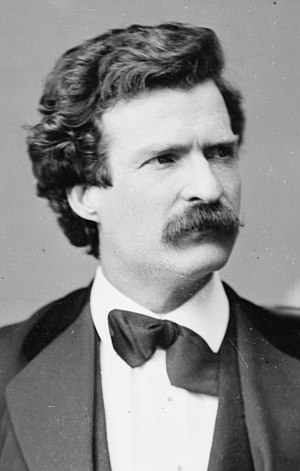Chapters I and II were OK, but to be honest, I wasn't really woken up until the first remarkable bit that I ran into which was Chapter III, "Baker's Blue-Jay Yarn." It reads like a short story. A short story told by some man and then retold by Twain. It's about a hermit who has lived so long away from civilization, that he begins to be able to, or imagine that he is able to, understand the language of the animals. In particular, he mentions the language of the blue-jays. He then tells this funny story about one particular blue-jay who finds a hole. He becomes so fascinated by the hole, which happens to be the knot hole in the roof of an old abandoned cabin, when he drops an acorn in it to see if he could hear it hit the bottom.
What was most charming about this story is that it was so easy to see the descriptions of this particular blue-jay as it tried to study and understand the nature of this hole. It is exactly the kind of description which one might have recalled when observing a blue-jay. What starts as a simple mystery becomes blown way out of proportion. Before long, the entire forest of blue-jays have gathered around this mysterious hole until one old jay manages to solve the mystery of it, and finds all the acorns on the floor of the cabin.
 Image via Wikipedia July 25
Image via Wikipedia July 25This book is quite long. For the most part, it does seem like it's an autobiographical account of experiences that Mark Twain had gone through.
The part I have been reading for awhile now is concerning his adventures in the Swiss Alps. He has gone on some massive expeditions, including about 150 members of a team, to ascend to the top of a mountain. However, the story quickly becomes ludicrous to the extent that I am inclined to believe that the whole tale is a mixture of what is true and what is not.
For example, where I'm at right now, Twain is trying to lead his climbing expedition back down to civilisation from the top of a glacier. His solution to getting down is to jump with an umbrella to slow down the fall. This is just one of the comical episodes which seems to beleaguer the poor folks who signed up to join his expedition.
July 29
Toward the end, I am given the impression that Twain greatly misses his own country. He refers to a significant amount of food that he misses. Certainly, I can identify with that. A lot of time I do find myself missing the vast quantity of choice selections one has opportunities of in Canada. The gigantic stores which exist even in towns which support very modest populations offer a seeming acre of choice selections. Everything from a hundred flavours of potato chips to an endless refrigerator of different flavours of ice creams. Meats in giant proportions and discount prices are also etched strongly in my mind. The Korean grocery store might offer more varieties of rice and seaweed... but I don't eat either one of them to the same proportion that the average Korean family does. Well, perhaps next year.
Finally, I have finished reading about Twain's epic journey on foot across Europe. A few thoughts: Twain at this time must have been very wealthy. Also, he did not tramp across Europe as the title implies. He did more travel via train and slept in hotels and in other ways lived the easy version of the tourist's life.
It is not a bad book. It has a certain charm to it. However, I am not altogether certain if I would recommend it for the period of time it took me to read it. There are a few interesting tidbits here and there. Really, it read like something he had written well after he had met with his literary success. As such, it was not written from the perspective of one who by necessity tramped across Europe (for a lack of funds). In any case, the absurd moments were funny at times and enjoyable. However, they are really needles in haystacks. Read at your own discretion. I will neither advocate for it or against it.

No comments:
Post a Comment